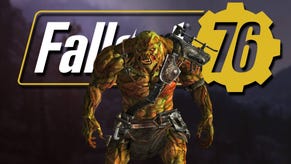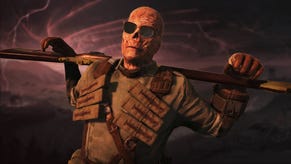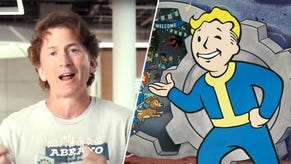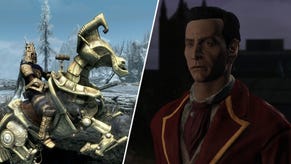As Skyline Valley releases, Fallout 76’s lead producer reveals how the Fallout TV show has helped shape the DLC
Has the runaway success of Amazon’s TV show impacted how Fallout 76 devs approach making the game? “Yes and no”.
“There was a similar IP that was already established,” lead producer Bill LaCoste tells me when I ask him, on a bit of a whim, whether there’s anything he learned while working on NBA Jam in the early 2000s that still applies to his current work on Fallout 76.
“We had to rebuild a lot of that from scratch ourselves, and it was really like, ‘how do we maintain consistency’, because, at the time, we weren't associated with Midway – we just had the licence to do NBA Jam. So, it was like ‘we need to recreate this, we know what makes it fun for people, we know what people are going to enjoy out of this’. With a Fallout game, it's the same thing: there's already lore, there are established timelines that are already there. We have to make sure that we are representing that title correctly.”
When Fallout 76 initially launched back in October 2018, in an underwhelming fashion that’s been very well-documented at this point, it stuck out among its Fallout siblings. It was unpopular, and unpopular in ways that LaCoste says he picked up on while playing it at that time – before he joined Bethesda. Then, as part of the process of joining the team a little bit before 2020’s Wastelanders update, LaCoste says he flagged the areas of improvement he’d identified to the development team (in a manner expressly designed to be constructive, by the way).
“I went through the same struggles everyone else did,” he tells me. “Oh man, there's a lack of NPCs. I don't feel like everything is here. And I voiced that when I was doing interviews. But I also said, ‘I know you all are thinking about this in the future and where it's going to go, and I want to be part of that’.
“I had a lot of feedback for the team, but because I had been doing this for a while, I understood the problems – not really even the problems, but the challenges - that the teams would go through,” he says. “I knew that they had a story. I knew that they were going to be telling more of a story, it wasn't going to be just this ‘oh, here's West Virginia, go have fun, we're done with this’ and wash your hands of it.”

Since that interview, Fallout 76 has undergone a pretty dramatic transformation – both in the amount of new content that’s been added in, and by the processes Bethesda has implemented to tackle the array of technical challenges that come with making a game like 76 run smoothly.
“I think, at the beginning, one of the major things that we wanted to hit on was making sure that stability was better. Making sure that if players are in the game longer, and they're playing longer and not crashing, they don't have the opportunity to go play another game,” he tells me.
“Even if we're developing a new set of features like we're talking about with Skyline Valley,” he adds, “there are systems within the game that probably have a backlog of issues that might get more exposure because of the new Skyline Valley content. So, we'll make sure to roll those into the development.”
As with many of its Fallout siblings, 76 got a bump in player count recently, following the release of the Fallout TV show. This injection of fresh blood didn’t cause any unique issues and was treated like the interest swells new updates generate, even giving the team a reason to improve the early game experience for new players by tweaking locations, enemies, and how loadouts are introduced.
And that, it turns out, has been a perfect segue into Skyline Valley itself, the new Fallout 76 expansion that arrives today, June 12 (the game is being taken offline for it to be applied at 3PM BST/10AM ET). With this new expansion, the idea is to create a new locale “that’s new, but also gives every single player within our game something to do within that space”, no matter which aspects of the Fallout 76 experience different people might be more interested in.

As to whether there’s been any extra pressure to capitalise on the sheer number of people trying the game for the first time (or giving it another chance) off the back of Amazon’s Fallout series, LaCoste says that the answer is both “yes and no”. 76 is Bethesda’s most recent Fallout release, after all.
“There is pressure, because you know all these people are coming in, it's a lot of people, and we want to make sure that the game we provided them is obviously working and is of good quality and has all the right content,” he explains. “But then, we put that pressure on ourselves all the time, every time we release a patch or an update, we are constantly looking at feedback, we're getting that stuff in there and, because we know where we came from the 76 at launch to where we are now, we're still focused on the future.”
Given all of the chatter about the next single player entry in the series that the TV show naturally spawned - even if it’s pretty clear that The Elder Scrolls 6 will be arriving before Fallout 5 - I asked LaCoste a bit about how he feels 76 currently fits with regards to the wider series at this point.
“We have a long-term plan for 76 and I don't think we'll be expected to really bridge any gaps between the games,” he told me. “This game, it exists in this part of the [Fallout] world during this part of the [overall series] timeline, and whatever is decided for a Fallout 5 in the future is going to co-exist with those games, just like the TV show.”

In terms of how he thinks Fallout 5’s eventual release might impact 76 in terms of player attention, he added: “I think we will constantly or consistently have players who still play 76, because we still have players who play Fallout 4, Fallout 3, even two and one because those got re-released, and they play 76 as well. I think that that will be the same case even when Fallout 5 comes out, people will go play it of course, but I believe there will be a number of people who always come back and play 76, as [they’re] just playing a game within the Fallout universe.”
While it’s a modding project not directly affiliated with Bethesda, I also asked LaCoste whether he and other developers have been aware of Fallout: London, which has also garnered a lot of attention within the series’ community as it’s inched closer to a release which has only recently ceased being up in the air due to Fallout 4’s recent updates. “A little bit, because a lot of us are Fallout fans and so we've always been kind of paying attention to all the mods and the new updates and also just the fan-created content that's out there,” he replied.
“So, yeah, we look at that and again I always love how engaged our community is, it's not just across 76 or even just Fallout in general, but The Elder Scrolls, too. I mean there's people building tons of mods for Skyrim and things like that. So I think it's really just a shout out to our community who really engages with all the Bethesda Games Studios games and how much they like and enjoy playing in those spaces.”
However, as LaCoste tells me, he and the team are still totally focused on Fallout 76 as they get ready to release Skyline Valley. Even if the process of consistently improving upon the Appalachian experience might look a little different to members of the Acclaim marketing team rounding up Austin’s biggest NBA Jam fans and bringing them to the studio to offer some feedback on how it feels to throw down a Kobe to Shaq alley-oop.
Fallout 76's Skyline Valley expansion arrives today, June 12, with the game being taken offline for itsa deployment at 3PM BST/10AM ET/7AM PT.









